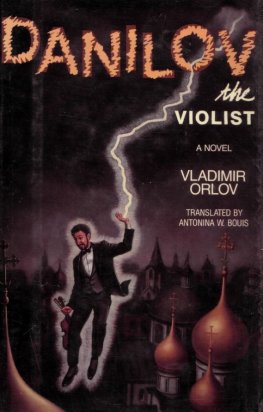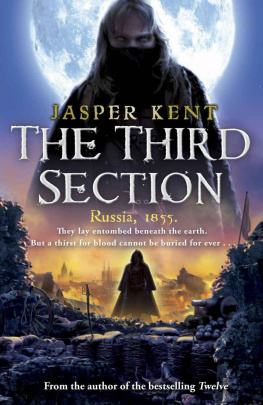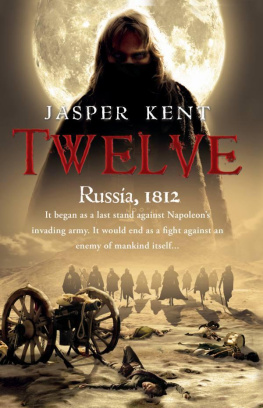Vladimir Orlov
Danilov the Violist
a novel
VLADIMIR ORLOV
Translated by Antonina W Bouis
Copyright 1980 by 'Novy Mir', nos.2,3,4;
Text Copyright 1978 Vladimir Orlov
English translation by Antonina W. Bouis 1987 by William Morrow and Co., Inc.
ISBN 0-688-04655-X
1
Danilov was considered a friend of the Muravlyov family. And he was. And even now he is still a friend of the family. In Moscow these days every cultured family tries to have its own friend. No one but me knows he's a demon. And I learned that rather recently, even though, I suppose, I had noticed a few strange things about Danilov. But that's merely incidental.
Nowadays Danilov does not visit the Muravlyovs very often. But before, every Sunday, if he didn't have a matinee, Danilov dined with them. He came with his instrument -- he had his reasons for that. Let me close my eyes and recall one of those Sundays.
... At the Muravlyov apartment there is great bustling from early morning, there are delicious smells, finely chopped lamb bought at the market awaits its hour in a pot, baby string beans tumble from their glass jars into oiled frying pans, and the coffee maker materializes on the French oilcloth of the kitchen table. Ah, what aromas fill the apartment! What aromas are yet to come! On such a day the Muravlyovs need no other guests. Especially Kudasov and his wife. But it's Kudasov who comes most often.
Kudasov has a nose for dinners, drinking sprees, and tea parties. He merely has to twitch a nostril, and he knows which of his acquaintances has bought which foods and at what time they'll be setting them out on the table. Even before they get the tablecloth out of the linen closet, Kudasov is in a streetcar following the scent. Sometimes he doesn't even twitch his nostril, but a prophetic voice in his soul or his stomach speaks. It calls him softly, like Giselle's melancholy ghost. Kudasov can even tell if the food will be meager and tasteless, without pepper, without pastilles for the tea, or without a ham from Eliseyev's, in which case he doesn't come. But he has no doubts about dinners for Danilov; everything will be first-class. He worries only about being late and letting the food get cold. Here Kudasov doesn't trust his nose or the prophetic voice, for they might be malfunctioning. In the morning he checks the theater poster and figures out whether Danilov is performing or not. He knows Danilov's entire repertoire. Just to be sure, he calls the theater, too: "Has the performance been canceled?" Kudasov knows that the Muravlyovs will be entertaining Danilov if there's a cancellation.
Kudasov isn't a poor man. He's a lecturer. But he longs to eat at others' expense. And he gets so tired of words at his work that he becomes totally harmless at the table -- he doesn't say anything, just chews and swallows, only occasionally stopping to clarify something, so that someone's wild thought doesn't run off too far or try to slip around the corner. His wife is silent, too, but she has an unpleasant way of smacking her lips.
Neither Danilov nor the Muravlyovs especially need Kudasov, but they do put up with him. After all, he is an old acquaintance, and after all, Kudasov's brazenness knows no hindrance from any obstacle, any trap, any diplomatic ruse, or even an armored tank. He'll come anyway, apologize, and sit down at the table. Like a trained lion on a stool. And he'll always hand his hosts a bottle of cheap dry wine -- and then how could you possibly show him the door? The only consolation is that he'll eat three servings of the meat course and then immediately nod off at the table, while Danilov and the Muravlyovs quietly enjoy the meal.
"The lobio* is excellent today!" Danilov exclaims.
"Have some of this salad," Muravlyov urges. "It's got nuts, and cheese, and mayonnaise dressing."
"Sauce Provencale," Danilov corrects him, and as he sets aside the yellow dish, he praises the hostess as ostentatiously and sincerely as usual.
The hostess is right there, flushed with her exertions, ready to head for the kitchen to fetch yet another dish for her guest.
And here, in an enormous bowl, comes Uzbek plov, steaming, seemingly alive, each grain of rice separate, with just the right amount of meat and fat; its dotted here and there with black barberries brought from Tashkent, and redolent cloves of garlic, peeping out from the saffron mounds of rice. The aroma! It's so wonderful that even in the villages near Samarkand, connoisseurs are turning their faces toward Moscow.
Kudasov, naturally, regains consciousness and receives a bowlful of plov with an extra helping. Now he can go to sleep for good or off to someone else's house, and not bother to wait for the coffee.
"There now," Muravlyov says to Danilov, "and you tortured yourself and us for two years with your vegetarianism!"
"I did torture you," Danilov agrees. And adds sadly: "But I still feel sorry for them... And for that lamb... And for his mother who is now all alone..."
"Nonsense ... Metaphysics ..." Kudasov wakes up. "You skip all the evening political seminars, I'll bet."
"Let's not have any of that, Valerii Stepanovich." Tamara, Muravlyov's wife, rises as if to defend Danilov with her breast, if necessary. "On the contrary, Volodya attends all the seminars!"
"And the mother of this plov ," adds Kudasov, "has long ago been turned into sausage. So there's nothing to feel sorry about."
"Don't be like that," Danilov says gently.
But now it's time for the tea and coffee -- and all melancholy evaporates. Danilov himself performs the ritual at the Muravlyov house. He brews green and Russian tea, and coffee beans exclusively from the sun-baked Arabian soil (Danilov scorns Brazilian beans, which he finds too insipid and acidic). Every tea, according to Danilov, must achieve its proper shade of color and that goes without saying for coffee, too. Danilov, as he stands in the kitchen over the gas range, is Doctor Faustus in Gounod's blue-black opera (which he played on Wednesday -- Blinnikov sang Faust and in the intermission after the second act paid a bottle of cognac to Danilov over a hockey bet.) And now he silently brings in the teapots and coffee makers on lacquer trays.
"How is it?" Danilov asks anxiously.
"Marvelous!" says Muravlyov. "As usual!"
Then Danilov sits with his hosts in the twilight. He stretches out his long thin legs, with his feet in Muravlyov's worn slippers; and blissfully drowsy, he listens to Okudzhava's record, which he bought in Paris on the Boulevard Saint-Michel for twenty-seven francs. Or he listens to nothing, and hums Buba Kastorskys's lines from "The Elusive Avengers" -- he holds the tune in low esteem, but he can't get it out of his head. And, without responding to Muravlyov's remark on construction in the quay district, he falls asleep in the armchair. He gets very tired: He performs both with the theater orchestra and in concerts, for he has enormous expenses with his instrument and two co-op apartments. The hostess comes over to him, fixes the suspender that had slipped from his skinny shoulder, covers him with a camel's hair blanket, and gives him a soulful, maternal look. She sighs and leaves the dining room, and remembers to put out the light...
But I repeat: That's how it used to be. Now Danilov seldom dines at the Muravlyovs'. Once a month. No more ...
2
Danilov doesn't attend the meetings of the house spirits anymore, either. But previously, after performances, Danilov would sometimes come to the house with the turret on Argunovskaya Street. The Ostankino-area house spirits met there in the building super's office. Danilov himself wasn't a house spirit, but he was assigned to them.
He liked some of the house spirits. House spirit Velizarii Arkadyevich, a funny old man from a moderne-style town house, thought that he was pure lofty spirituality, and had a soft spot for Danilov. Such as a lonely pensioner living in the sticks might have for a brilliant nephew in the capital. When Velizarii Arkadyevich was depressed, he would quietly ask Danilov to hum him a few arias from Tchaikovsky's









